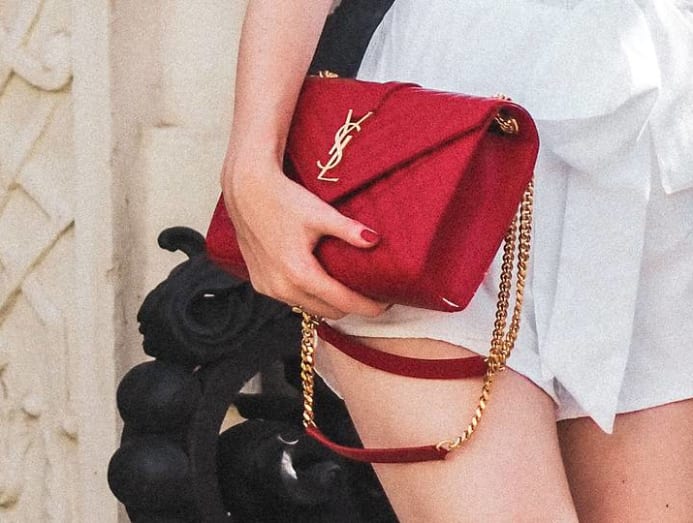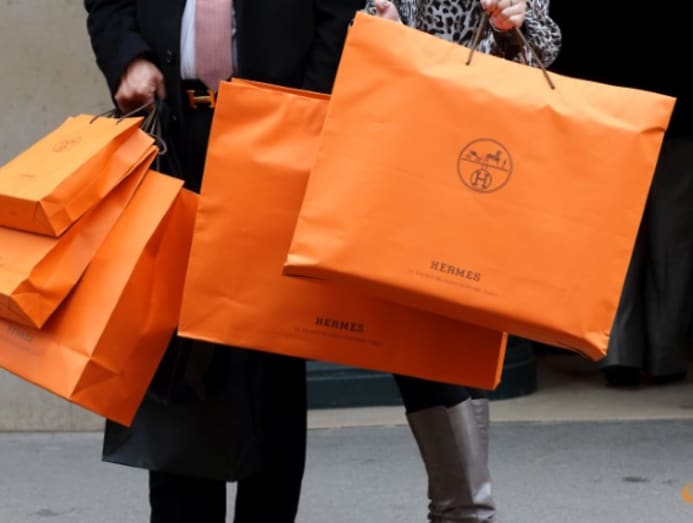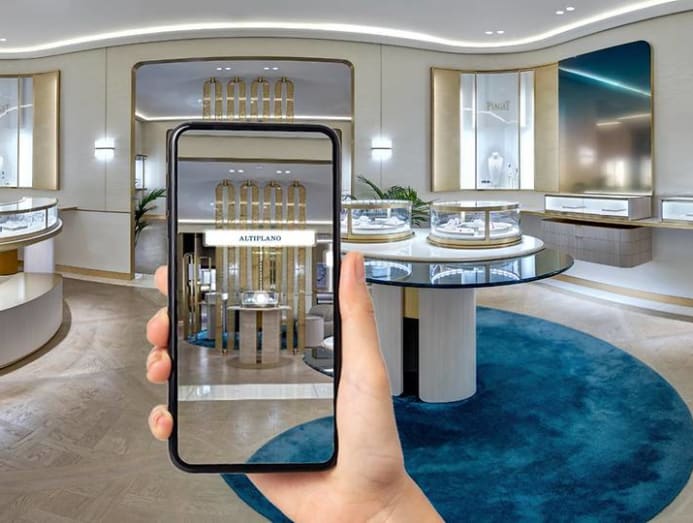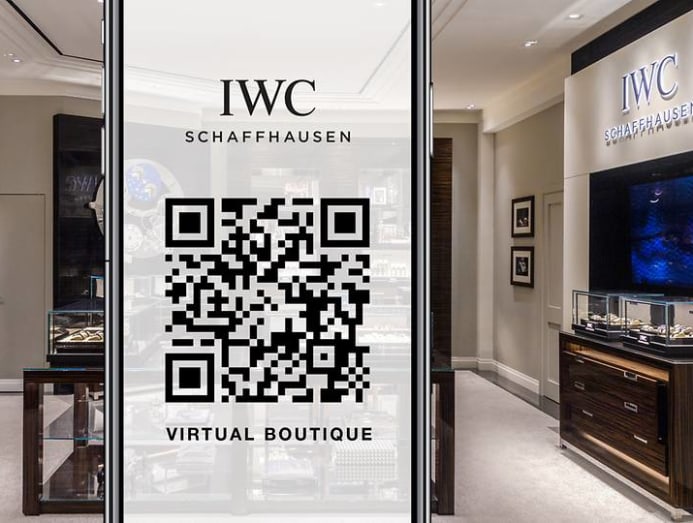Expert view: How luxury brands should engage customers in the post-pandemic era
To arrange to the new normal of working from home, some people buy ergonomic chairs, while others set up extra calculator screens. Gianfranco Casati, chief executive function of Accenture in growth markets, "fabricated an investment" in a big backdrop depicting Singapore's stunning Marina Bay skyline which he sits in front of during video calls.
"This gives my colleagues the perception that I am sitting on my terrace overlooking Marina Bay, which is not actually the case," he said with a chuckle. This glitzy properties, which separates his desk from the balance of his home, is not simply a chat starter for online meetings; it has allowed Casati to go along his business running efficiently during these challenging times.
"I did this to ensure I have work and personal space to keep the balance considering nosotros're doing this for months," said the Singapore-based Casati, who has management oversight for all industries and services of Accenture'southward business in the Asia-Pacific, Africa, the Centre East and Latin America, which accounted for United states$8.5 billion (S$11.8 billion) in revenues for the fiscal year 2019.
Similarly, smart pivots – whether on a pocket-size scale like what he has done or on larger manufacture-wide scales – beyond all fields volition be essential for businesses hoping to stay adrift in these times. This is particularly important for luxury companies that pride themselves on offer customers an feel that is a cutting above the norm, he added.
Casati shared his insights on how the luxury manufacture should be transforming their businesses.
HOW Have LUXURY SPENDING PATTERNS BEEN IMPACTED Past THE PANDEMIC?

We did a specific deep-dive in Singapore as we run into Singapore as quite a proxy of consumer behaviours when it comes to the way consumers regard luxury goods in this situation. We accept seen an increase of luxury goods purchases online in a way which has been actually quite material but these haven't been able to get-go the loss of sales in the traditional channels.
As well traditionally, there used to be a direct correlation between luxury goods and travel because a substantial part of sales is associated with tourists who spend when they take leisure time. That is a large driver of sales in big malls in Hong Kong, China, Nippon and Singapore. This has completely decoupled. It is something that luxury brands have to reflect on going forwards.
READ> Why were consumers in Asia ownership luxury handbags during the lockdown?
SHOULD THE INDUSTRY Exist PLACING HOPE ON THE CONCEPT OF "REVENGE SPENDING"?

When living in a hard situation, some people may wish to pamper themselves such equally by ordering food from premium restaurants or by gifting somebody something they would normally not consider. It is a way of reacting to the "misery" of the [circumstances].
So yeah, there may exist some revenge spending. Merely in my opinion, we should not overplay that because it is not going to be an enduring element and companies need to think of something else to sustain spending.
"There may be some revenge spending. Simply… we should non overplay that because information technology is not going to exist an enduring element and companies need to think of something else to sustain spending."
READ> Revenge spending? Hermes store in Prc hauls in South$3.8m a day after reopening
AS Prophylactic DISTANCING RULES GRADUALLY RELAX, WILL THIS BE A Depict FOR PEOPLE TO Head OUT MORE Frequently?
Twoscore per cent of consumers we surveyed later the easing of circuit billow rules say they are still uncomfortable to go dorsum to the traditional retail experience.
We believe it will take time to render to normal, then omni-channel experiences will be vital to luxury brands, because they will accept to complement the concrete and digital in club to continue to fulfil their customers' expectations.
HOW Tin LUXURY INDUSTRIES Better CATER TO CUSTOMERS IN THE DIGITAL SPACE?

Customer appointment is going to be crucial to many sectors in the luxury space and combining the offline and online customer experience volition be of central importance.
For example, the wellness manufacture could have face-to-confront sessions followed by virtual sessions to go on their level of engagement with customers in an extended mode. Through this evolution of dialogue and relationship, companies can provide the luxury feel that customers are looking for.
"Customer engagement is going to be crucial to many sectors in the luxury space and combining the offline and online customer feel will be of central importance."
ARE At that place Any FORMS OF Cutting-Edge Engineering science THAT CONSUMERS CAN LOOK FORWARD TO?

Virtual reality is something that volition go part of the broader gear up of tools that companies volition have to invest in to build relationships with their clients.
For example, in the sector of furniture and furniture pattern, augmented or virtual reality could give y'all an idea of what your room or apartment would look like with a new item.
Or you might be able to "endeavour" on apparel in different styles and colours without leaving your room and in the space of minutes instead of hours. These developments would drive incremental sales, so it is likely that this applied science may evolve more than rapidly.
"Virtual reality is something that volition get function of the broader set of tools that companies will take to invest in to build relationships with their clients."
WHAT ELSE Volition LUXURY BRANDS WANT TO FOCUS ON TO STAY RELEVANT?
Information technology is not necessarily just digital investments but also investments that create a sense of purpose and identity to establish themselves as responsible businesses.
Consumers are condign more sensitive to values such every bit being environmentally friendly and socially responsible, especially later the pandemic. And so how brands volition evolve in this space and how fast they can practice information technology would decide how much success they will enjoy in the well-nigh hereafter.
Another aspect that luxury brands may desire to do is to increase the visibility of their iconic products. For example a Chanel or Hermes handbag are iconic products but they are iconic typically to but a express number of consumers. And so telling the story of these products and making these stories available to a wider range of people can assistance to create a better awareness of the brands.
"Consumers are condign more sensitive to values such equally being environmentally friendly and socially responsible, particularly later the pandemic."
READ> COVID-19: How the pandemic could assistance push us into a greener way of life
stanfordadeatimeng.blogspot.com
Source: https://cnalifestyle.channelnewsasia.com/people/how-luxury-brands-should-engage-customers-247736
0 Response to "Expert view: How luxury brands should engage customers in the post-pandemic era"
Postar um comentário